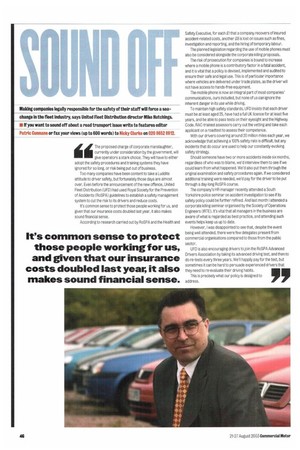6 currentlyT h eproposed unde charge hconsiderationa r' ge of co o by tteli e m g a o n v s e la r u n g m ht e e n r t: will
Page 46

If you've noticed an error in this article please click here to report it so we can fix it.
give operators a stark choice, They will have to either adopt the safety procedures and training systems they have ignored for so long, or risk being put out of business.
Too many companies have been content to take a Luddite attitude to driver safety, but fortunately those days are almost over. Even before the announcement of the new offence, United Fleet Distribution (UFD) had used Royal Society for the Prevention of Accidents (RoSPA) guidelines to establish a safety management system to cut the risk to its drivers and reduce costs.
Its common sense to protect those people working for us, and given that our insurance costs doubled last year, it also makes sound financial sense.
According to research carried out by RoSPA and the Health and Safety Executive, for each .E1 that a company recovers of insured accident-related costs, another £8 is lost on issues such as fines, investigation and reporting, and the hiring of temporary labour.
The planned legislation regarding the use of mobile phones must also be considered alongside the corporate killing proposals.
The risk of prosecution for companies is bound to increase where a mobile phone is a contributory factor in a fatal accident, and it is vital that a policy is devised, implemented and audited to ensure their safe and legal use. This is of particular importance where vehicles are delivered under trade plates, as the driver will not have access to hands-free equipment.
The mobile phone is now an integral part of most companies' communications, ours included, but none of us can ignore the inherent danger in its use while driving.
To maintain high safety standards, UFD insists that each driver must he at least aged 25, have had a full UK licence for at least five years, and be able to pass tests on their eyesight and the Highway Code. RAC-trained assessors carry out the vetting and take each applicant on a roadtest to assess their competence.
With our drivers covering around 20 million miles each year, we acknowledge that achieving a100% safety rate is difficult, but any incidents that do occur are used to help our constantly-evolving safety strategy.
Should someone have two or more accidents inside six months, regardless of who was to blame, we'd interview them to see if we could learn from Mat happened. We'd also put them through the original examination and safety procedures again, if we considered additional training were needed, we'd pay for the driver to be put through a day-long RoSPA course.
The company's hiFt manager recently attended a South Yorkshire poke seminar on accident investigation to see if its safety policy could be further refined. And last month I attended a corporate Wing seminar organised by the Society of Operations Engineers (FITE). ft's vital that all managers in the business are aware of what is regarded as best practice, and attending such events helps keep us up to date.
However, I was disappointed to see that, despite the event being well attended, there were few delegates present from commercial organisations compared to those from the public sector.
UFD is also encouraging drivers to join the RoSPA Advanced Drivers Association by taking its advanced driving test, and then to do re-tests every three years. We'll happily pay for the test, but sometimes it can be hard to persuade experienced drivers that they need to re-evaluate their driving habits.
This is precisely what our policy is designed to address.
































































































































































